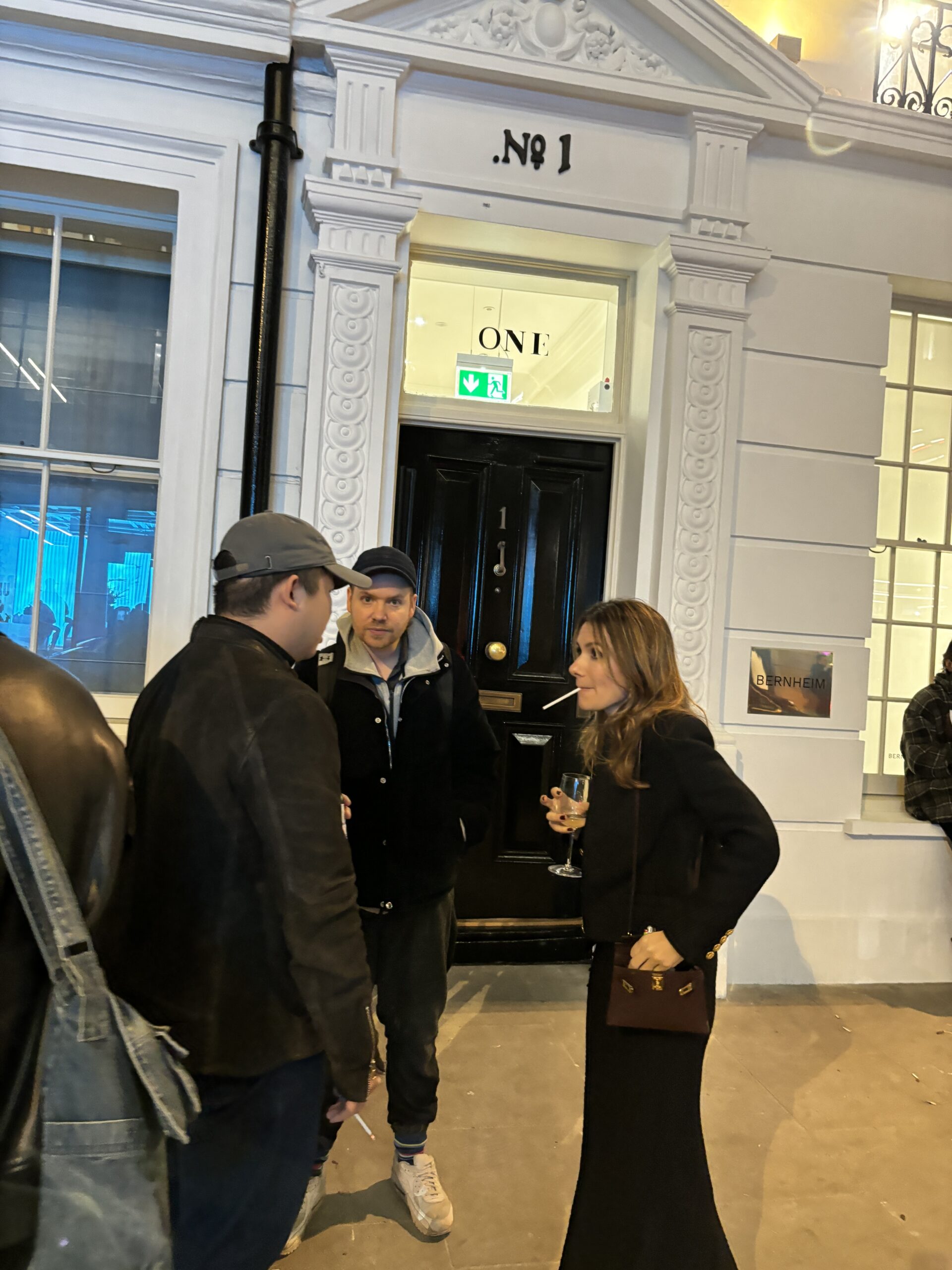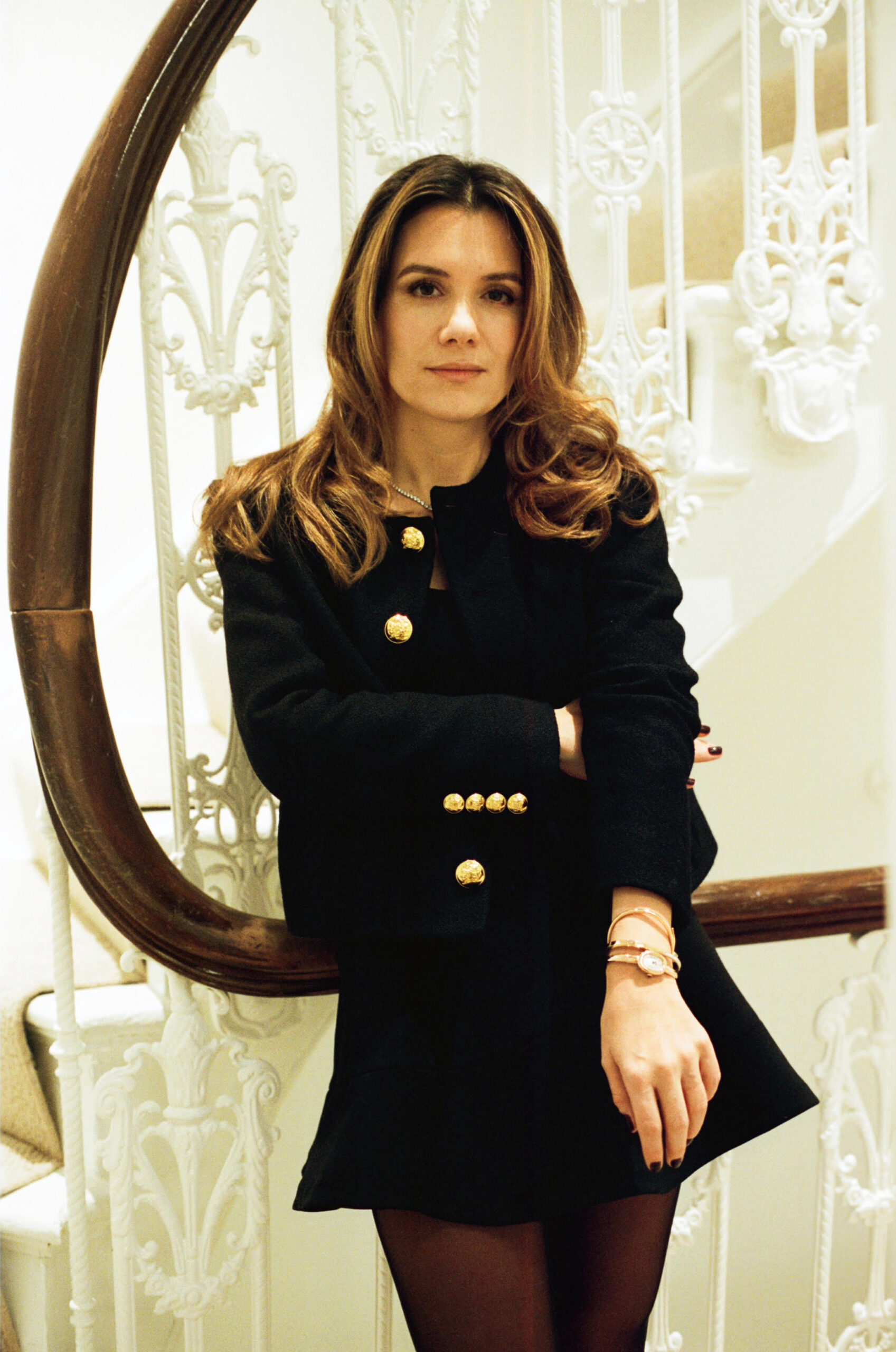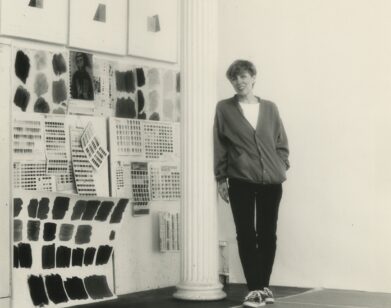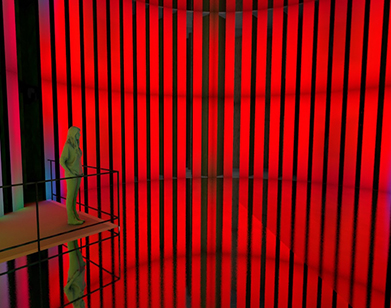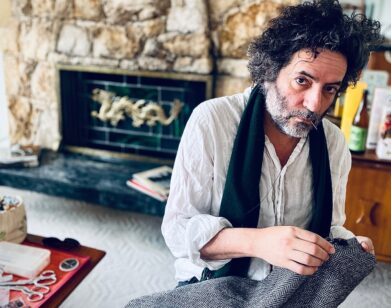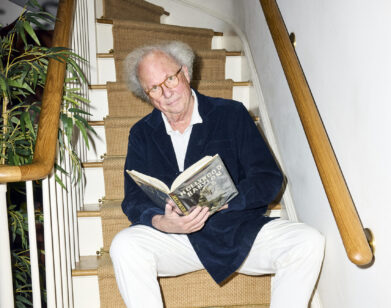OPENING
Maria Bernheim on Scammers, NepoBabies, and Getting Hit On at Art Fairs
There’s only one gallery in London with five floors. It’s located on 1 New Burlington Street and was just leased from the Crown Estate by Maria Bernheim, who’s kicking off her huge property bid with a group show titled “The Big Chill.”
Opening night last Thursday included some new, young and coming artists such as Tolia Astakhishvili, from Tbilisi, Min Jia, whose web address is minjia (dot) parts, and Ebecho Muslimova, aka “@ebecho”, an account followed by both Lauren Servideo and Adrian Schachter. The artist Rachel Rossin is also included, even though she once tried to log her genome as a non-fungible token. Though Bernheim doesn’t deal with crypto or NFTs, she lets history slide.
The top two floors of the gallery were cordoned, so naturally everyone tried to get up there. Long-legged patrons grabbed the staircase railing and stepped over the rope without touching it. A few blue- chip London artists showed up too, like the prolific painter Hannah Tilson and Embankment penthouse party-host Oli Epp.
Bernheim herself was not running up and down the floors on hyper-namedrop drive (she had other people do that for her). Instead, she hung out with with the smokers outside, maintaining an edge on everyone else as the only person who knew there was an old operational elevator in the flagship building. Amidst the chaos of opening night, she and I chatted about setting up the space in London, scammers, dealers, collectors, and the ethics of selling a piece of art a friend just gifted you.
———
NIMROD KAMER: What did you say this building was before?
MARIA BERNHEIM: It was a Ralph Lauren private tailor. It didn’t look like this at all.
KAMER: There’s lots of bureaucracy in renovation?
BERNHEIM: Oh, my god. It was the permit, everything. You’re not allowed to move the sockets. Everything is regulated, very complicated.
KAMER: How come you put carpet on the staircase? So British.
BERNHEIM: We have to, but you’re going to see that we also have carpet on the landing.
KAMER: French people don’t like carpets on staircases. Gets dusty.
BERNHEIM: We don’t like carpet so much in general.
KAMER: So it’s a group show?
BERNHEIM: Yes.
KAMER: At various prices?
BERNHEIM: Exactly, artists at different levels of their careers. For some people, it’s their first time showing. Others are much better known.
KAMER: It’s the tallest gallery building in London.
BERNHEIM: That’s a good way of putting it. Everybody’s like, “You’re crazy to do this.”
KAMER: Why do they say that?
BERNHEIM: Because usually people at my level, or people who show art in my range, don’t do something on this scale.
KAMER: As big as this, and next to Regent Street, with unknown artists plus tourists?
BERNHEIM: Yeah. Although we do have Jon Rafman, if you know him.
KAMER: I do. First time I saw his art was that xanax-girl video in Berlin.
BERNHEIM: He’s coming tonight.
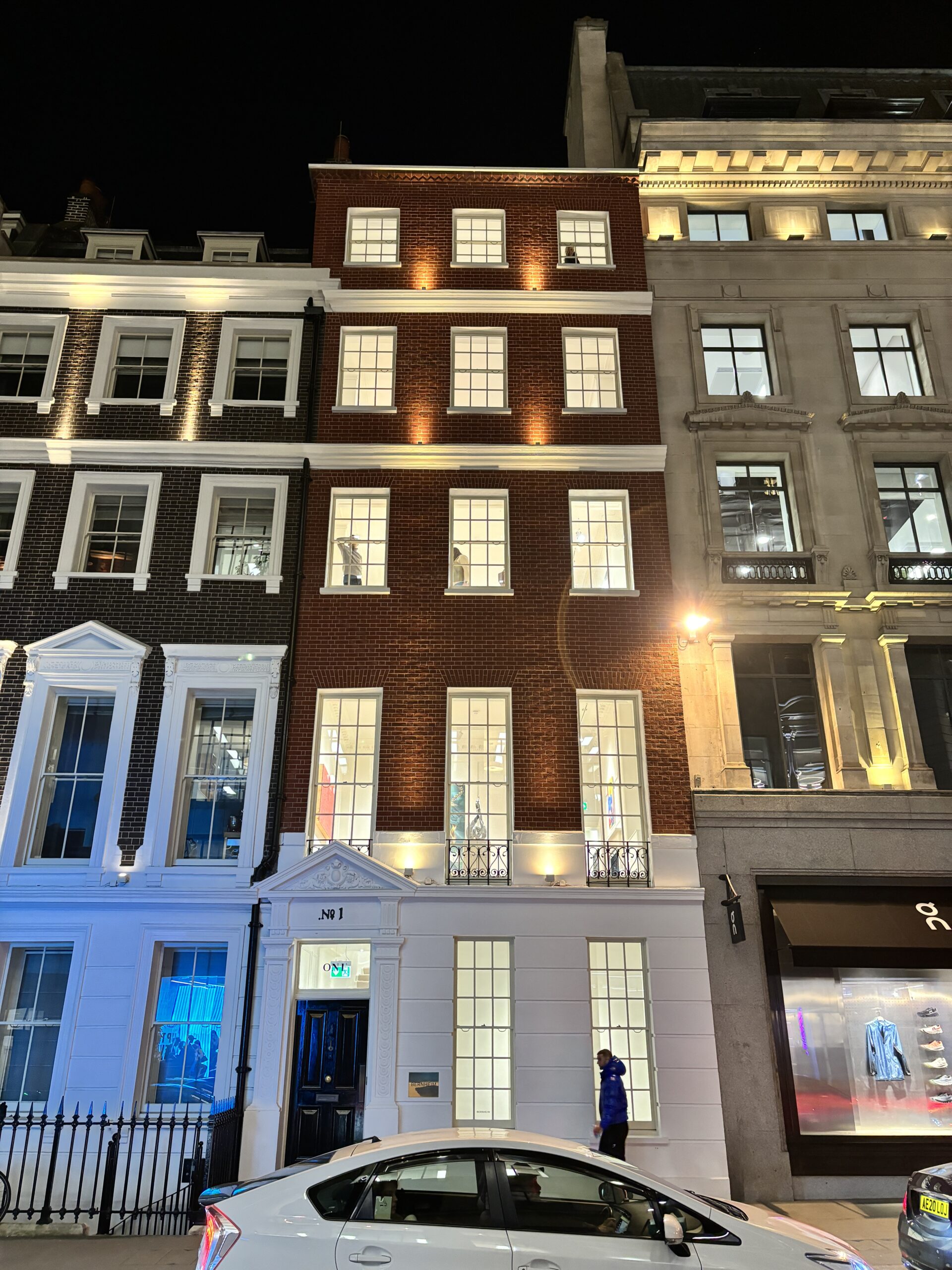
Bernheim Gallery, London.
KAMER: Jon likes me, I think. But some don’t. Every time I’m in New York Kenny Schachter invites me to his house, but Nate Freeman never asks me to hang out.
BERNHEIM: Really?
KAMER: Yeah. I even crashed Nate’s wedding after-party at Lucien. Maybe if I’d known him early enough… so many people pretend to be busy now.
BERNHEIM: Right.
KAMER: Do you find that selecting new, unknown artists, can suddenly, in a few months, become the hottest chips?
BERNHEIM: Sometimes. I would say it takes way longer than that.
KAMER: And then people beg you to get to know them, to intro?
BERNHEIM: Exactly. And I’m like, “Where were you this whole time when nobody wanted their work?”
KAMER: It’s an ego chamber..
BERNHEIM: Exactly. Look here on the fourth floor, we have ceiling lights and a living room vibe.
KAMER: It’s the only art space I’ve seen with carpets and sofas.
BERNHEIM: Part of what we do is sit around and have conversations about art. It’s what we’re interested in. When you chill and you look at a painting for a while, it grows on you in a different way than if you’re just walking around an exhibition.
KAMER: Standing is so boring.
BERNHEIM: It’s… overrated.
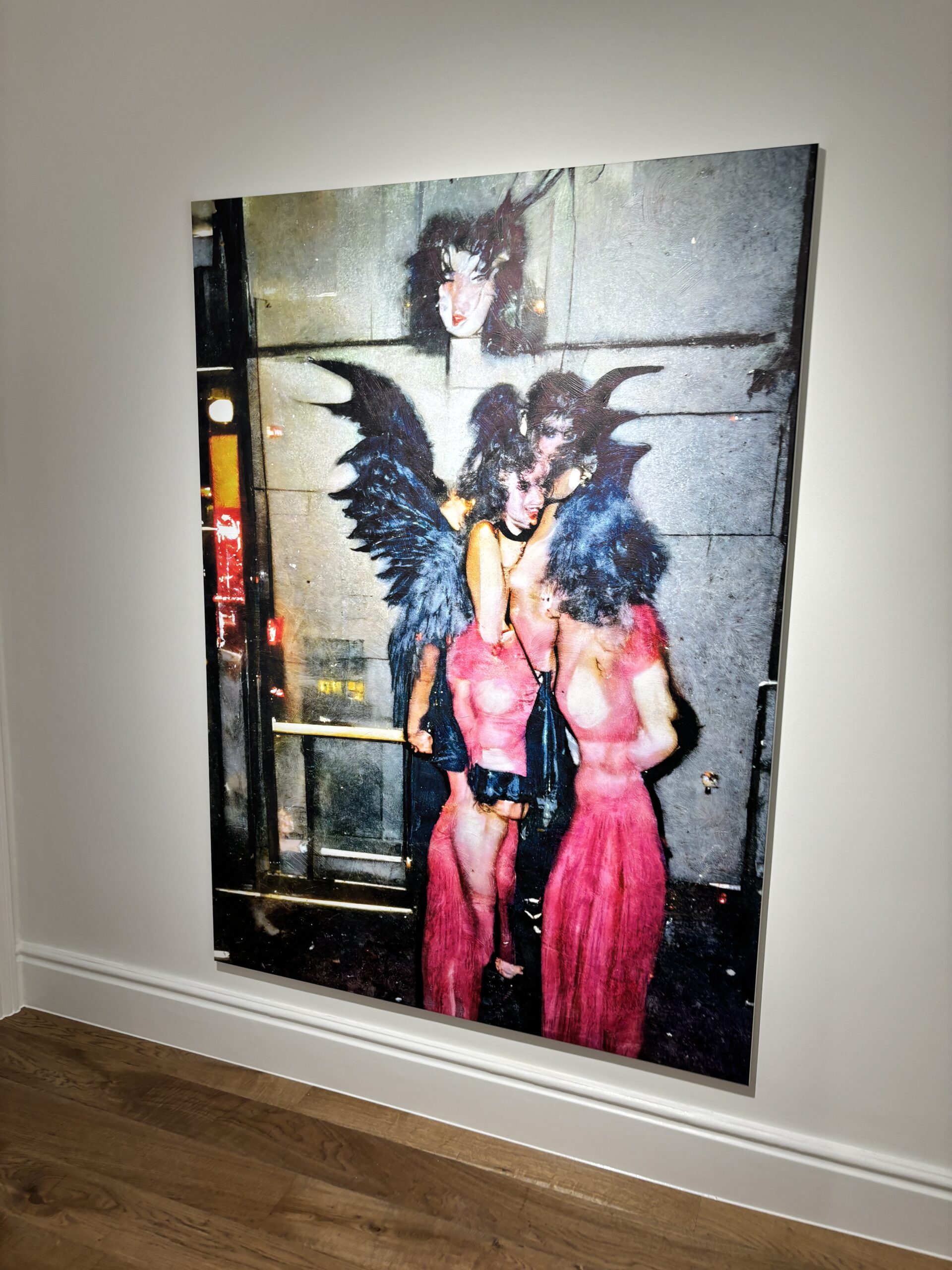
KAMER: A few people I know assume your father left you loads of money, by the way.
BERNHEIM: Maybe because of the scale of what I’m doing. I’ve heard all sorts of different stories, like that I suddenly found a rich husband. It’s strange that nobody ever wants to just acknowledge that you’re willing to put in the hard work, that you’re willing to make sacrifices and build something big. And that it takes time.
KAMER: So you never had a trust fund?
BERNHEIM: Definitely not. I was born in communist Romania. We had zero money. I came to France with nothing, didn’t even speak the language. I’m sure you can relate.
KAMER: I’m Romanian too. And Israeli.
BERNHEIM: Maybe it’s the immigrant, Jewish bloodline, the expectation that you have to be the best at school and be the best at everything. I went to Oxford when I was 16. My parents don’t even speak English. I just worked my ass off.
KAMER: People think everyone from Zurich is naturally rich.
BERNHEIM: Also, a lot of people tend to think I’m old before they meet me. That’s typically the standard story of someone who’s had a gallery for twenty years. I think people are surprised that a person of my generation would want to do something on this scale.
KAMER: Do randoms go into the gallery just to hit on you?
BERNHEIM: It happens all the time at art fairs. They just come into my booth and talk to me and they basically just want my number.
KAMER: Art talk as pickup line?
BERNHEIM: Yeah. They think it’s a pickup line or they’re doing me a favor. I’m not sure.
KAMER: So you’re done with art fairs and biennales?
BERNHEIM: Having a show here in London for two months and making sure people come and see it is going to be more beneficial for me in the future than four days putting on a circus in an art fair.
KAMER: It’s humiliating to have someone sit in a booth in Miami Basel, having to pretend they’re interested when nobody’s really buying.
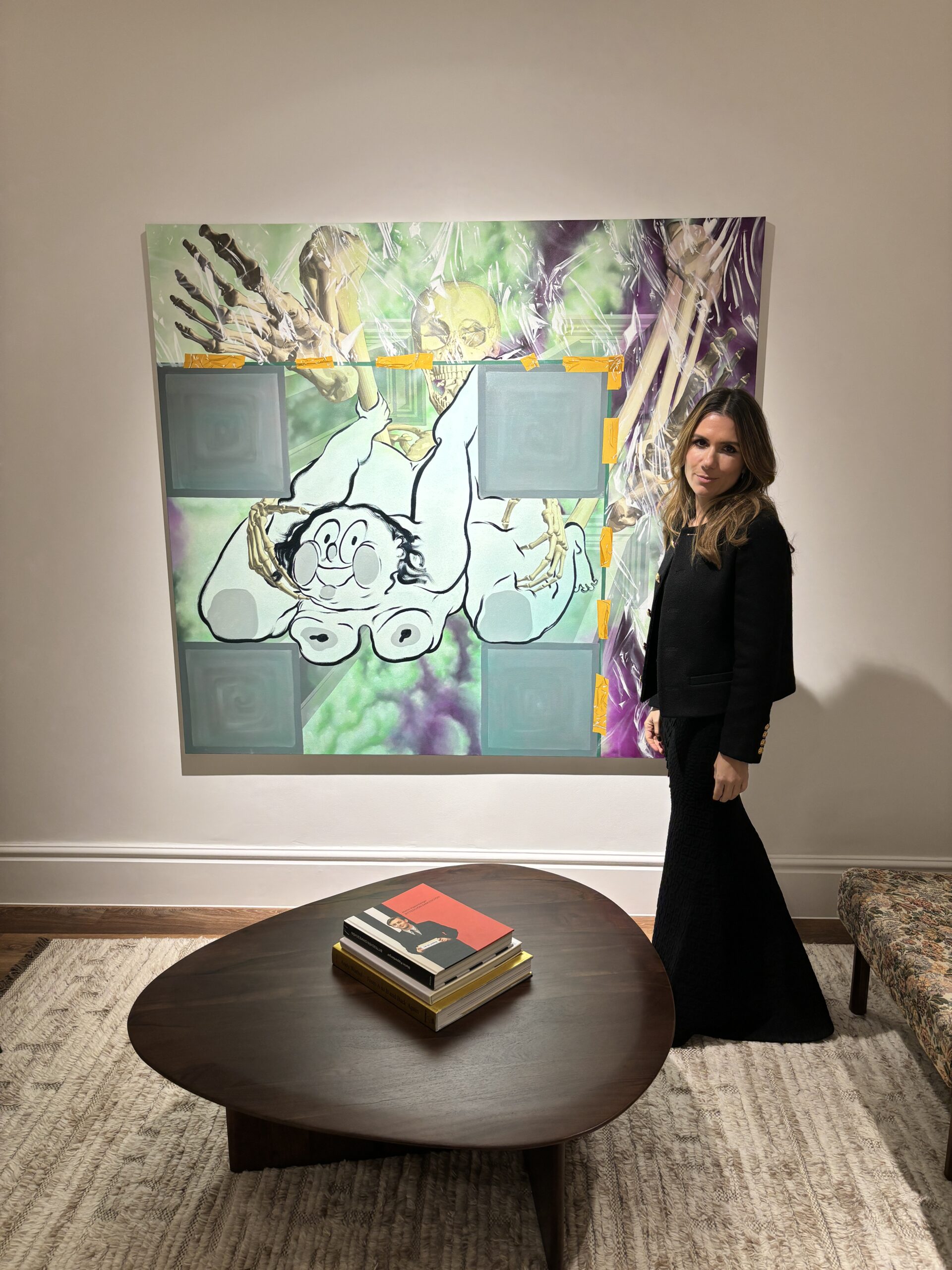
BERNHEIM: It’s hard. And it takes a lot of energy. A lot of money goes into shipping, insurance, things that don’t necessarily benefit the artist. Ultimately, we do this for the artist, to give them a platform, to get people to see the work and have real conversations about it. Pre-COVID, we did like eight fairs in a year, from Mexico to Geneva. And I’ve recently realized that it’s just not that interesting.
KAMER: It’s pretty exhausting too. Did you encounter any art scammers, like Inigo Philbrick types?
BERNHEIM: It’s something that’s always looming. For us, it’s a big problem. For example I have a waiting list for an artist, then a buyer will call and pretend they’re somebody else with thousands of artworks in storage, and if I sell them the work they’ll quickly flip it for more money.
KAMER: I have an ex friend, Henry Hudson, who is a plasticine artist. He gifted me one of his prints and I sold it on eBay immediately. Is it bad that I’ve done that? I don’t know.
BERNHEIM: Did you make money?
KAMER: I didn’t sell it for that much, but he got so angry at me.
BERNHEIM: At some point, art can be worth a lot to people who could actually use it to put their kids through college. Does that make sense? At that point, yes, but there’s a certain way to do it. I think the reason we’ve managed to get this far is that people feel comfortable bringing the work back to me and I could sell it for them. The system can work.
KAMER: What do you think of art merchandise?
BERNHEIM: I haven’t done any. I’m wondering if that’s cool. Are we establishing a lifestyle brand? That’s a real question because, for example, my neighbors Hauser & Wirth built the biggest gallery in the world. They’ve gone all-in on lifestyle. They have hotels, they’re opening restaurants. They hired the CFO for Fortnum and Mason.
KAMER: Why is everyone still sucking up to Gagosian and the White Cube? I’m so tired of them.
BERNHEIM: A sad part of what’s happening in the art world is we’re going to become Hollywood. You’re going to have huge blockbusters, big studios like Warner Brothers, and end up with Hauser & Wirth & Gagosian.
KAMER: Now the White Cube owner’s daughter, Angelica Jopling, has her own gallery. It’s opposite the Chiltern Firehouse. And everyone wants to be her friend.
BERNHEIM: People are obsessed with power and money everywhere, no? It’s representative of any scene.
KAMER: And nepotism.
BERNHEIM: What’s different in art, it’s actually very rare to see a long family dynasty, like the Kennedys, of collectors or artists.
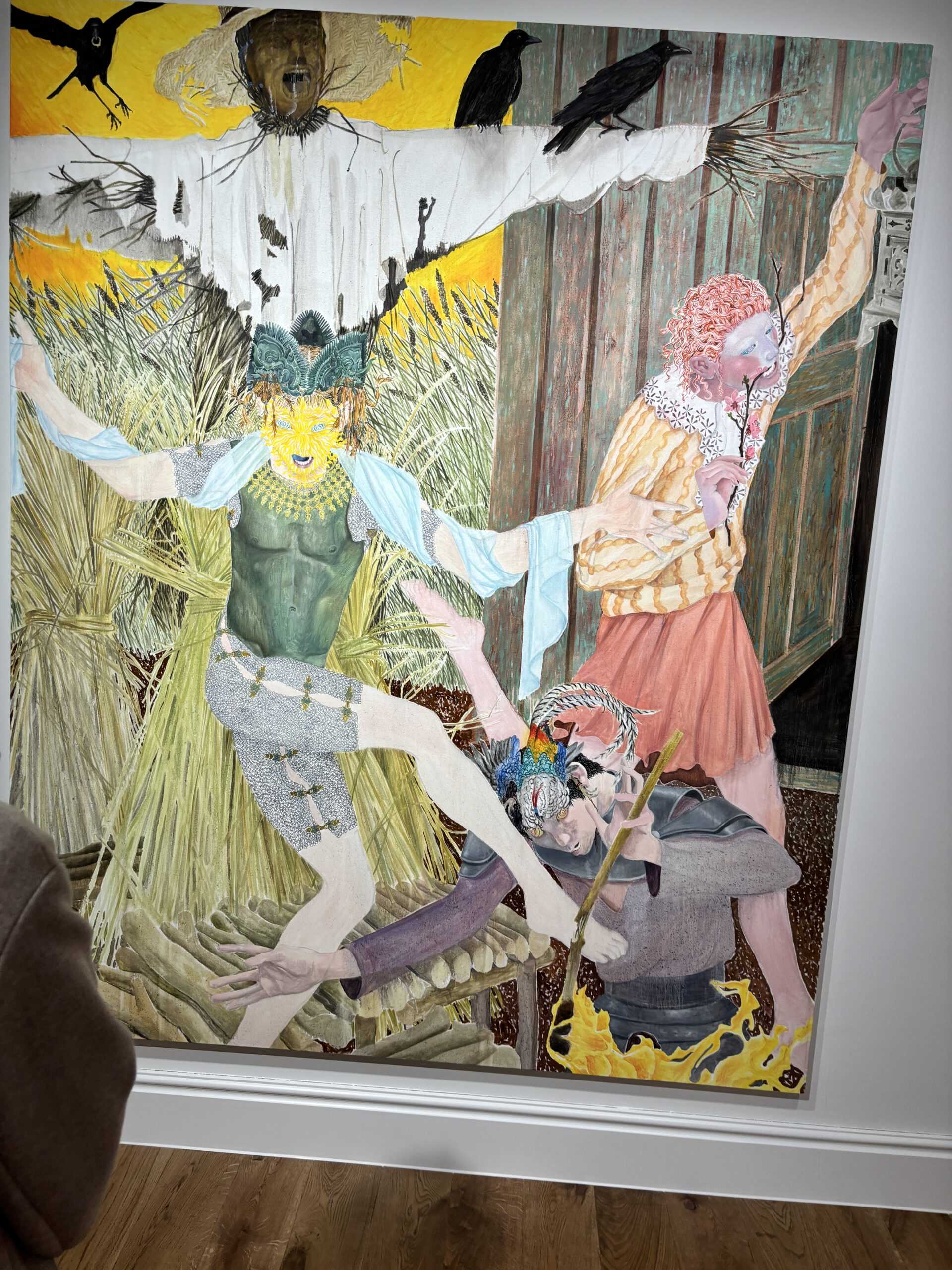
KAMER: Your gallery is called Bernheim, but not Maria Bernheim.
BERNHEIM: We changed that.
KAMER: How come?
BERNHEIM: I wanted it to be less about me. When you start having different locations, it’s important to stay focused on the artists, and that anyone who walks in is being taken care of by whoever’s working in the gallery that I trust fully. That’s very important.
KAMER: What’s the name of this piece?
BERNHEIM: This is FATEBE from Above by Ebecho Muslimova, one of my first artists. I adore her work. We have similar histories. She came from Dagestan in Russia to New York. Sometimes we call each other to talk about random food that our mothers used to make. When you decide to work together, it’s like a marriage. For the good times and the bad and everything in between. And sometimes you get your heart broken.
KAMER: Like when an artist leaves you?
BERNHEIM: Yeah.
KAMER: Who made this piece by the way?
BERNHEIM: Tsai Yun-Ju. She’s Taiwanese, based here in London. She is also friends with another artist of the gallery, Ding Shilun.
KAMER: So they’re actually friends, the artists in this group show?
BERNHEIM: Yeah, they’re real friends.
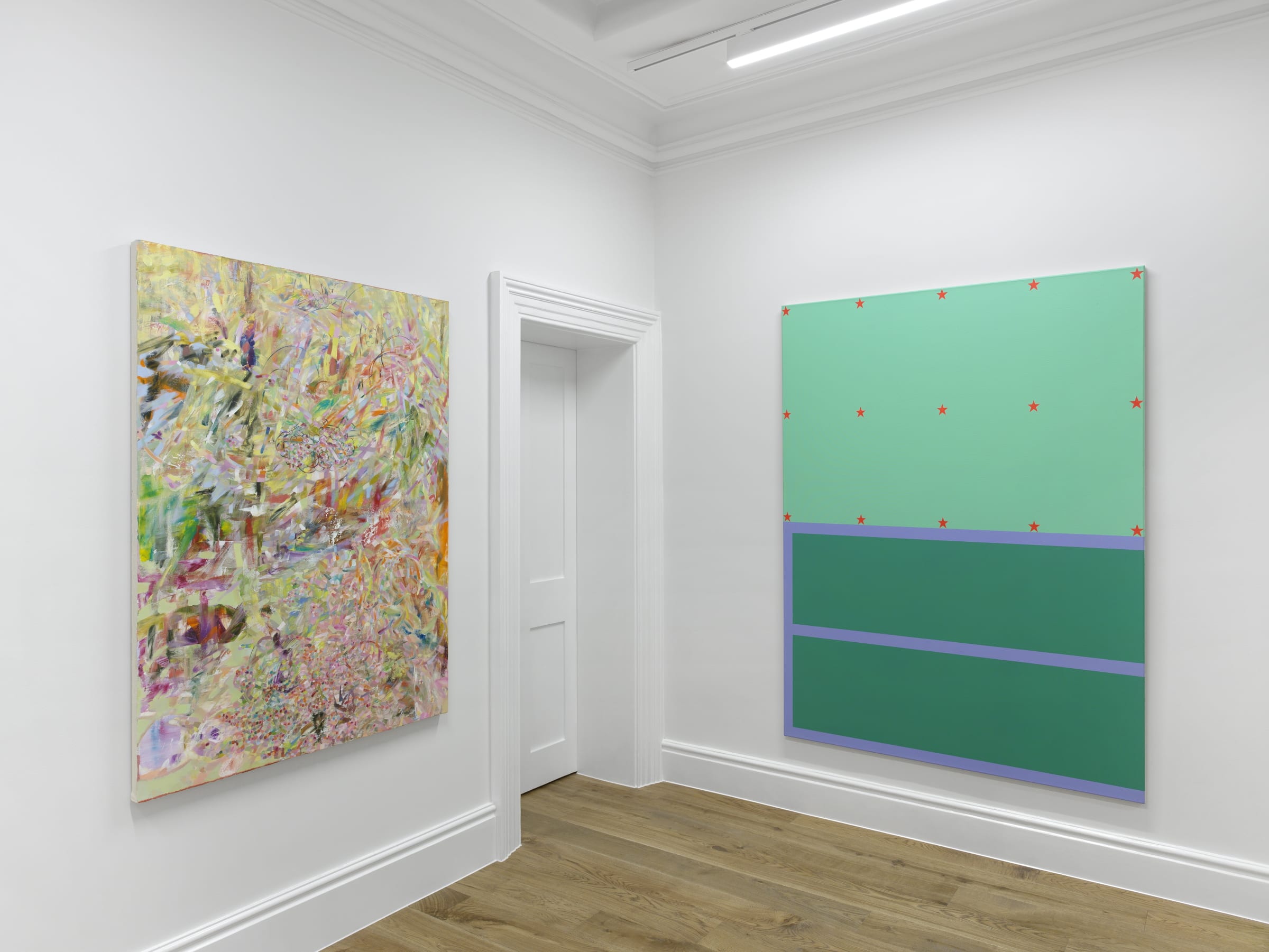
KAMER: Usually artists hate each other in group shows, especially when only one of them sells.
BERNHEIM: I wanted to make sure that that wasn’t true. Last night we all went out for ramen and karaoke.
KAMER: What’s your take on auctions? Do you sometimes auction paintings from your private collection just for fun?
BERNHEIM: Of course not. The terrible thing about me is I’m not the best gallerist, because I’m a collector at heart. I spend all the money I make and just collect and collect. I buy things from all the artists in the gallery and outside of it. It’s a weird bug. When you have it, you can’t stop.
